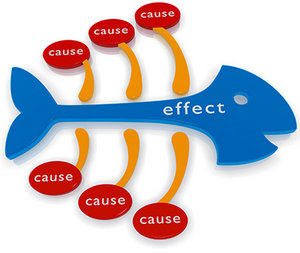 The CEO of the company I work for recently shared a tweet with us summing up an insight she gained at a recent engagement she attended, which read as follows:
The CEO of the company I work for recently shared a tweet with us summing up an insight she gained at a recent engagement she attended, which read as follows:
“Nick Farr-Jones dinner guest at conference key message focus on process not the scoreboard and you will get result.”
I like this tweet – the words, whilst short, are incredibly important for anyone wanting to make improvements. I thought it useful to dig into this a bit.
Dr W. Edwards Deming was very clear on this point! He set out the practise of ‘Management by results’ (e.g. focusing on a scoreboard of outcomes) as one of the diseases of a ‘modern organisation’ and, instead, proposed that we should spend our time and focus on understanding and improving the processes that produce the results i.e. the results are the outcome of something, and you can look at the outcome till you are blue in the face…but this won’t make it change!
“The outcome of management by results is more trouble, not less….Certainly we need good results, but management by results is not the way to get good results….It is important to work on the causes of the results – i.e. on the system. Costs are not causes: costs come from causes.” (Deming, The New Economics)
Professor John Seddon (think ‘Deming on steroids’ for Service organisations 🙂 ) takes this message on further. He notes that the measures used in most organisations are ‘lagging’ or ‘rear-view’ measures – they tell you what you did.
Seddon has a very clear view on measurement but at this time I want to simply put forward his thinking regarding the difference between operational and financial measures. He says that we should use:
- Operational measures (such as demand for a service, and a processes capability to deliver against its purpose) to manage; and
- Financial measures (revenues, costs) to keep the score.
We know that one affects the other but we can never know exactly how and it is waste to divert time and effort to try to do so.
Bringing this back to Nick Farr-Jones and Rugby: A rugby coach uses process measures to manage (e.g. passes complete, line-outs won, tackles made…) and the result quite literally as the score!
So Nick Farr-Jones, Deming and Seddon quite clearly agree with each other. If you work on the capability of a system/ value stream/ process to deliver against its purpose (as from the customer’s point of view) then the results will come.
Finally, you may be thinking ‘ah yes, this is where the balanced scorecard comes in’…there’s a post in there! Watch this space.
[…] Conversely, if they had focused on a numeric KPI target to reduce bereavement leave usage, they would likely never have achieved such a major change, any improvement would have been unlikely to have lasted…and, in the long run, it may very well have become worse! This is because they wouldn’t have understood the cause. This links back to my earlier post on the folly of managing by results. […]
LikeLike
[…] culture is a result, an outcome, just like its financial situation. As I wrote in one of my first posts, we shouldn’t be attempting to ‘manage by results’ (as in “let’s […]
LikeLike
You’ve made some good points there. I checked on the net to
learn more about the issue and found most people will go along with your views on this site.
LikeLike